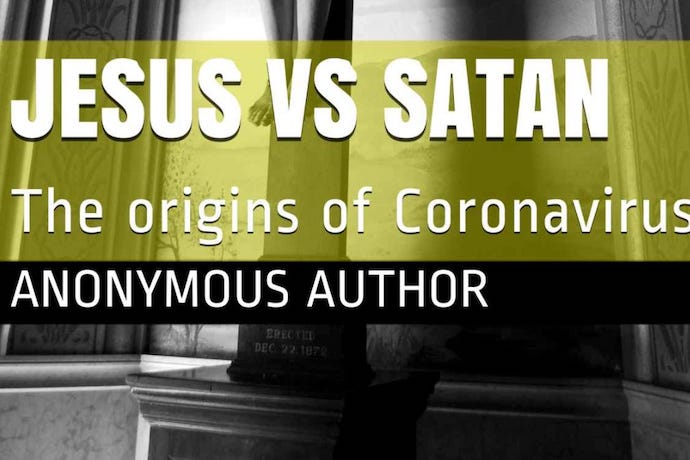“Satan is trying to keep us apart, he is trying to keep us from worshipping together,” Kelly Burton, pastor at Lone Star Baptist Church in Texas, announced on Facebook, while refusing to practice social distancing for Palm Sunday. This is, of course, nothing novel. Fear and uncertainty make a great concoction to bring the Devil back to life. Anywhere, anytime. Human history is a continuum of moments when the Devil takes the stage, and our moment is no exception. Since the drastic escalation of Covid-19 cases worldwide in the past three months, the media has been invaded by invocations of Satan. Recent interpretations of religious, medical, and environmental developments through the lens of the cosmic archenemy remind us of the hidden costs of spiritual warfare.
Jesus vs. Satan: The Origins of Coronavirus, by an anonymous author, was sold out by early March. Another recent book, Coronavirus: Go Back to Dry Places, argues that “only God can cure coronavirus and offers a prayer against Satan. Pastor Perry Stone warned his audience that the coronavirus is Satan’s plan to kill old people so that socialism can rule. In March editorial, the editor of First Things magazine, R. R. Reno, argued that “Satan prefers sentimental humanists,” and asserted that Satan relies on our fear of death. Understanding the scale of the pandemic in the following weeks, Reno made a public apology where he emphasized that “events had overtaken his judgments.”
Around the same time, the Polish archbishop Andrzej Dzięga preached that the faithful should not fear the coronavirus because “Satan is powerless in the face of holy water.” The televangelist Kenneth Copeland’s exorcism of the coronavirus, exquisitely analyzed by historian Simcha Gross, was a powerful reiteration of archaic prayer and curse before a neon purple background.
Addressing Satan, Copeland announced:
“You come down and you crawl on your belly like God commanded you when He put His foot on your head in the Garden of Eden. You will destroy through Covid-19 no more.”
The devil is let loose.
But again, this is not new. Take any disaster in human history, and we will find re-narrations of it in spiritual terms. The framework of spiritual warfare sometimes makes more sense than what perception offers. It’s just easier. Compared to the complexities of capitalism, xenophobia, poverty, mortality, and hopelessness, Satan is an easy fight to pick. Moreover, it’s sometimes the only battle one can afford. I understand the fellow human who finds comfort in the anchor of spiritual warfare when we’re all floating around six feet from each other.
We all breathe in the jitters and restlessness exhaled by the hoofed and horned Devil. The dichotomy of real and rhetorical dissolves in every new, slow, quiet day. Regardless, the issue isn’t whether the Devil is real or literary; it’s the categories such discourse is separating us into. As we all gradually become numbers in the triad of infected, dead, and recovered, we’re also pulled into the spiritual warfare of submission, defeat, and salvation.
One can preach that Satan is trying to trick people into staying away from churches. But clerics like Burton must remain accountable for the social pressure, the communal alienation, and the feeling of guilt on the shoulders of the believer who might look up another biblical verse to make meaning out of their self-inflicted isolation. Reno’s initial attempt to blame New York’s “demonic vibe” on those who satanically place life over “dignity and beauty” (that is, on those who choose to stay at home and not contribute to the economy) might be discredited as a familiar attempt on the part of the bourgeoisie to shame the proletariat into returning to the factory floors.
But such discourse also effectively classifies us into good citizens and harmful parasites; the dignified and the fearful; the godly and the satanic. Preachers and public intellectuals are responsible for the categories they create, since such classifications tend to outlive pandemics, wars, and disasters. In the post-apocalyptic future, when the crowned viral Beast is put in chains of vaccine and immunity, we will be left alone with our wounds to heal and stories to tell. Many of the invocations of Satan in popular media in relation to the pandemic today are giving us stories whose heroes and villains will be you and me, for feeling fear, anger, worry, love, or any other human emotion. Fear of death, or worry for life and health, is not a compromise of faith, as religion scholar Anthea Butler, among others, reminds us.
The harm caused by the satanic discourse isn’t restricted to the moral decrees upon human emotions, either. Spiritual warfare’s cost is higher than that. What sounds like a patriotic admonition or spiritual exhortation is creating new categories that map onto the old landscapes of class, race, and power.* Rhetoric of spiritual battle creates the illusion that we’re in this together as equals; surely the virus itself doesn’t discriminate between the wealthy and the poor. But the data clearly show that the pandemic hits the poor, minorities, immigrants, and other disenfranchised groups significantly harder. Satanic interpretation of the pandemic blurs those inequalities, which, in the end, will determine who has the economic and social luxury to work and pray at home.
In the weeks to come, we will hear from many others for whom our bodies, homes, and cities will be battlefields of spiritual warfare with Satan. Perhaps, like many before us, we can find some comfort in putting the Devil in an odd scene. Stuck in an icy hospital morgue, frozen from the belly down, like in Dante’s Inferno. Or, amazed at how wonderful cherry blossoms look, like a boy scout on a hilltop, the way Milton imagined Satan at the sight of the Garden of Eden in Paradise Lost. Or we can imagine Satan offended by God, refusing to have anything to do with humans, like many Sufi poets imagined him. While such creativity may partly soothe our suffering these days, let no crier of spiritual warfare halt our global battle for healthcare, equity, and justice.
I dedicate this piece to my students in the “Satan: History, Poetics, and Politics of the Archenemy” course at UPenn.
*See, for example, Amanda Furiase, “Is Covid-19 introducing a new generation to fears of ‘Jewish contagion?,” Religion Dispatches, March 31, 2020; Samuel Perry, “Americans who rage against political correctness are also the most xenophobic -and most likely to vote Trump in 2020,” Religion Dispatches, March 24, 2020.





